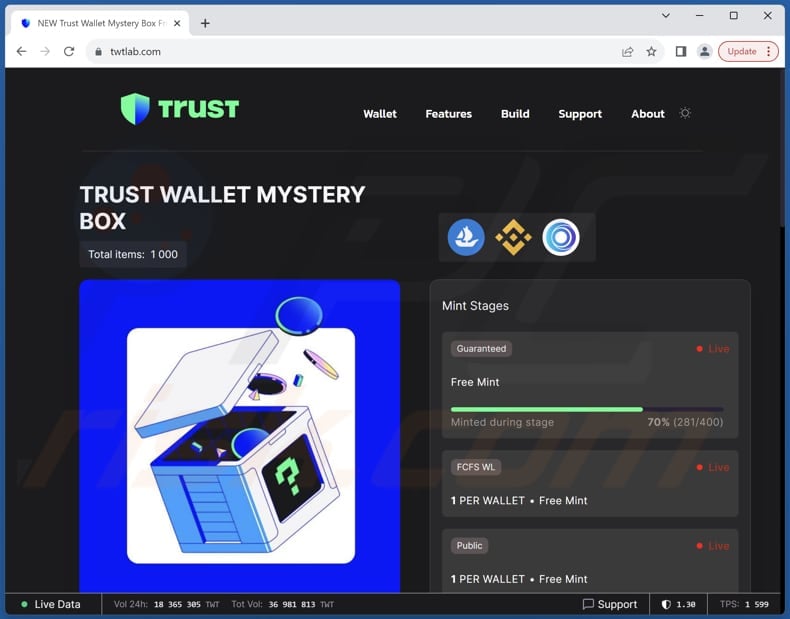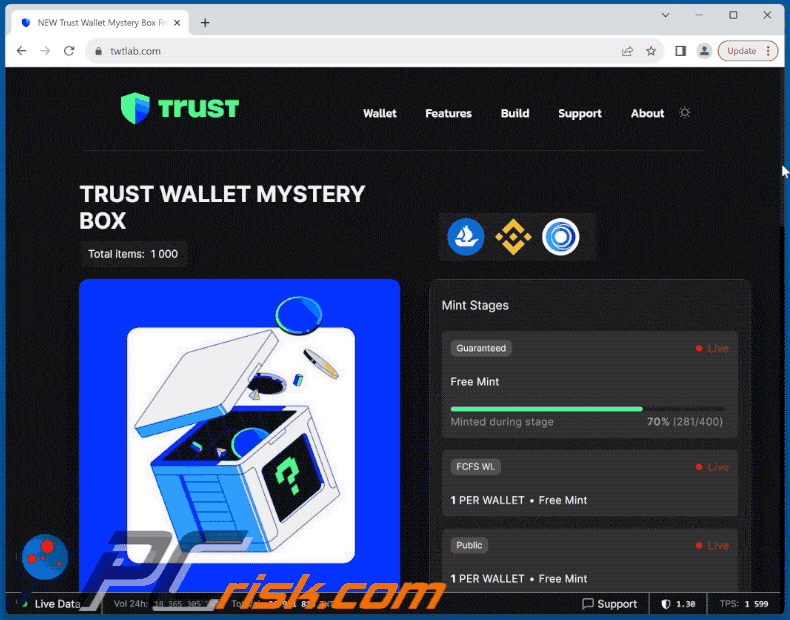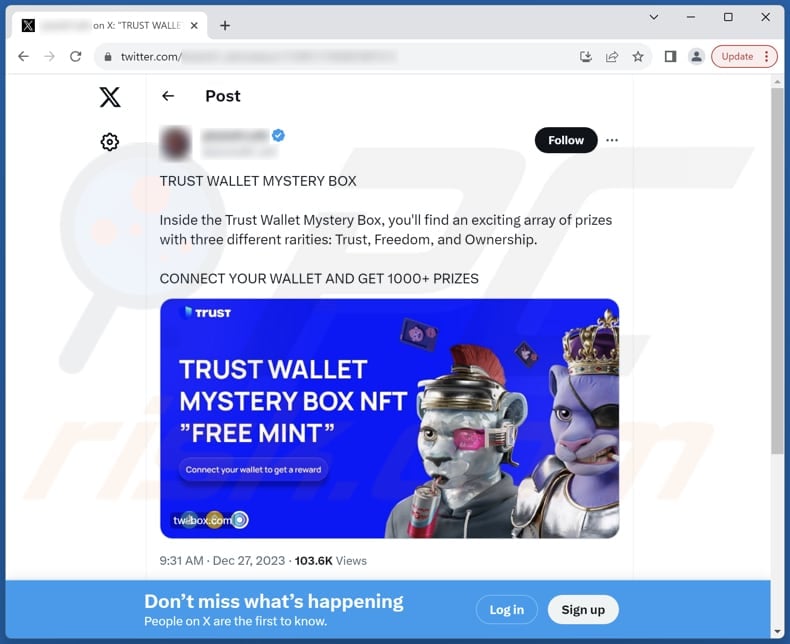How to identify fake offers like Trust Wallet Mystery Box
![]() Written by Tomas Meskauskas on
Written by Tomas Meskauskas on
What is "Trust Wallet Mystery Box"?
Upon inspecting this webpage and the associated post on X (Twitter) promoting it, it became evident that it constitutes a fraudulent giveaway, designed as a scam to pilfer cryptocurrency from unsuspecting individuals. Scammers commonly use enticing prizes or giveaways to attract victims into falling for their deceptive schemes.

"Trust Wallet Mystery Box" in detail
The post on X promotes the scam under the guise of a "Trust Wallet Mystery Box", enticing users with the promise of exciting prizes categorized into three rarities: trust, freedom, and ownership. In order to participate, individuals are encouraged to connect their wallets with the anticipation of receiving over 1000 prizes.
Using the link provided in the post leads to a deceptive page instructing users to connect their wallets to claim free cryptocurrency. Following the provided instructions results in the activation of a strategically crafted malicious contract designed to trigger a cryptocurrency draining mechanism.
The purpose of this drainer is to extract cryptocurrency from the connected wallets. Upon activation, the drainer facilitates the transfer of digital currency from the targeted wallet to the perpetrator's wallet. It is crucial to emphasize that cryptocurrency transactions are typically irreversible.
Typically, scams involving cryptocurrency drainers, such as the one under discussion, are promoted through posts on X (previously Twitter) or other social media platforms. Scammers use stolen or compromised accounts of organizations, companies, or celebrities to promote their scams.
| Name | Trust Wallet Mystery Box fake giveaway |
| Threat Type | Phishing, Scam, Social Engineering, Fraud |
| Fake Claim | Participants can receive free cryptocurrency |
| Disguise | Legitimate giveaway hosted by Trust wallet |
| Related Domains | tw-box[.]com, twtlab[.]com |
| Detection Names (tw-box[.]com) | Criminal IP (Phishing), Full List Of Detections (VirusTotal) |
| Detection Names (twtlab[.]com) | Avira (Phishing), Combo Cleaner (Phishing), Criminal IP (Phishing), Ermes (Phishing), Sophos (Malware), Full List Of Detections (VirusTotal) |
| Symptoms | Lack of official verification, unrealistic claims, too good-to-be-true promises. |
| Distribution methods | Post on X (Twitter), deceptive websites, rogue online pop-up ads, unwanted applications |
| Damage | Loss of sensitive private information, monetary loss, identity theft, possible malware infections. |
| Malware Removal (Windows) | To eliminate possible malware infections, scan your computer with legitimate antivirus software. Our security researchers recommend using Combo Cleaner. |
Online scams in general
In summary, cryptocurrency drainer scams often leverage social media platforms like X, utilizing compromised accounts linked to trustworthy entities to share misleading information. These scams exploit users' trust, encouraging them to follow instructions that trigger malicious contracts.
In order to protect against such prevalent cryptocurrency scams, it is essential to stay informed about these tactics, practice cautious online behavior, and verify information sources diligently. Examples of similar scams are "Buy Apple Products With Bitcoins", "AltLayer Token Airdrop", and "LENA Token Distribution".
How did I open a scam website?
Users often find themselves on deceptive websites through various means, such as clicking on phishing links in emails, falling for misleading ads, or interacting with fake software updates. Scammers also use social media to deceive users into clicking on links, leading to fraudulent sites.
Additionally, interactions with notifications from untrustworthy websites, ads from adware, and rogue advertising networks, like those on illegal movie streaming or torrent sites, can direct users to questionable sites.
The scam discussed in our article involves fraudulent posts on X (Twitter), leveraging stolen or compromised accounts of legitimate entities to promote deceptive content.
How to avoid visiting scam pages?
Prior to clicking on any link, carefully examine for misspellings or slight variations that could signal a potential scam. Stick to trustworthy search engines like Google, and avoid opening links or downloading attachments in unexpected or irrelevant emails. Exercise caution when encountering links shared on social media, as well as ads, pop-ups, and buttons on dubious websites.
Maintain skepticism toward unsolicited messages or pop-ups proclaiming prize winnings, demanding urgent action, or posing immediate problems. Keep your operating system, web browser,s and security tools up to date. Employ reputable antivirus and anti-malware software to enhance your overall online security.
If your computer is already infected with unwanted apps, we recommend running a scan with Combo Cleaner Antivirus for Windows to automatically eliminate them.
The appearance of "Trust Wallet Mystery Box" pop-up scam (GIF):

Post on X promoting the scam:

Instant automatic malware removal:
Manual threat removal might be a lengthy and complicated process that requires advanced IT skills. Combo Cleaner is a professional automatic malware removal tool that is recommended to get rid of malware. Download it by clicking the button below:
▼ DOWNLOAD Combo Cleaner
By downloading any software listed on this website you agree to our Privacy Policy and Terms of Use. To use full-featured product, you have to purchase a license for Combo Cleaner. 7 days free trial available. Combo Cleaner is owned and operated by Rcs Lt, the parent company of PCRisk.com read more.
Quick menu:
- What is Trust Wallet Mystery Box fake giveaway?
- How to identify a pop-up scam?
- How do pop-up scams work?
- How to remove fake pop-ups?
- How to prevent fake pop-ups?
- What to do if you fell for a pop-up scam?
How to identify a pop-up scam?
Pop-up windows with various fake messages are a common type of lures cybercriminals use. They collect sensitive personal data, trick Internet users into calling fake tech support numbers, subscribe to useless online services, invest in shady cryptocurrency schemes, etc.
While in the majority of cases these pop-ups don't infect users' devices with malware, they can cause direct monetary loss or could result in identity theft.
Cybercriminals strive to create their rogue pop-up windows to look trustworthy, however, scams typically have the following characteristics:
- Spelling mistakes and non-professional images - Closely inspect the information displayed in a pop-up. Spelling mistakes and unprofessional images could be a sign of a scam.
- Sense of urgency - Countdown timer with a couple of minutes on it, asking you to enter your personal information or subscribe to some online service.
- Statements that you won something - If you haven't participated in a lottery, online competition, etc., and you see a pop-up window stating that you won.
- Computer or mobile device scan - A pop-up window that scans your device and informs of detected issues - is undoubtedly a scam; webpages cannot perform such actions.
- Exclusivity - Pop-up windows stating that only you are given secret access to a financial scheme that can quickly make you rich.
Example of a pop-up scam:

How do pop-up scams work?
Cybercriminals and deceptive marketers usually use various advertising networks, search engine poisoning techniques, and shady websites to generate traffic to their pop-ups. Users land on their online lures after clicking on fake download buttons, using a torrent website, or simply clicking on an Internet search engine result.
Based on users' location and device information, they are presented with a scam pop-up. Lures presented in such pop-ups range from get-rich-quick schemes to fake virus scans.
How to remove fake pop-ups?
In most cases, pop-up scams do not infect users' devices with malware. If you encountered a scam pop-up, simply closing it should be enough. In some cases scam, pop-ups may be hard to close; in such cases - close your Internet browser and restart it.
In extremely rare cases, you might need to reset your Internet browser. For this, use our instructions explaining how to reset Internet browser settings.
How to prevent fake pop-ups?
To prevent seeing pop-up scams, you should visit only reputable websites. Torrent, Crack, free online movie streaming, YouTube video download, and other websites of similar reputation commonly redirect Internet users to pop-up scams.
To minimize the risk of encountering pop-up scams, you should keep your Internet browsers up-to-date and use reputable anti-malware application. For this purpose, we recommend Combo Cleaner Antivirus for Windows.
What to do if you fell for a pop-up scam?
This depends on the type of scam that you fell for. Most commonly, pop-up scams try to trick users into sending money, giving away personal information, or giving access to one's device.
- If you sent money to scammers: You should contact your financial institution and explain that you were scammed. If informed promptly, there's a chance to get your money back.
- If you gave away your personal information: You should change your passwords and enable two-factor authentication in all online services that you use. Visit Federal Trade Commission to report identity theft and get personalized recovery steps.
- If you let scammers connect to your device: You should scan your computer with reputable anti-malware (we recommend Combo Cleaner Antivirus for Windows) - cyber criminals could have planted trojans, keyloggers, and other malware, don't use your computer until removing possible threats.
- Help other Internet users: report Internet scams to Federal Trade Commission.
Frequently Asked Questions (FAQ)
What is a crypto scam?
A crypto scam pertains to dishonest schemes or manipulative actions within the cryptocurrency realm, wherein perpetrators employ deceptive tactics to exploit individuals for monetary benefit.
What is the purpose of a crypto scam?
The objective of a crypto scam is to acquire cryptocurrency by deceiving individuals into engaging in financial transactions based on false premises or providing personal information (access to crypto wallets).
Why do I encounter crypto scams?
To trap individuals, scammers employ various tactics, such as crafting fake social media profiles, deceptive web pages, untrustworthy advertisements, adware-infested apps, notifications from dubious sites, and similar channels.
Will Combo Cleaner protect me from scam pages?
Combo Cleaner has the capability to conduct comprehensive scans of visited websites, effectively identifying malicious sites, including those linked to scams. The application promptly notifies users and restricts access to unreliable websites.


▼ Show Discussion